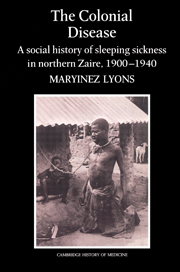Book contents
- Frontmatter
- Contents
- List of maps
- List of plates
- List of tables
- Preface
- List of abbreviations
- Map 1 Africa: political
- 1 Disease and medicine in the history of Africa
- 2 From private empire to public colony
- 3 Mise en valeur: economic exploitation
- 4 Epidemiology and ecology of human sleeping sickness
- 5 ‘The Lure of the Exotic’: sleeping sickness, tropical medicine and imperialism
- 6 Discovery: Liverpool scientists in the Congo
- 7 The campaign. Part one: sleeping sickness and social medicine
- 8 The campaign. Part two: the surveys and tensions
- 9 The African response
- 10 Public health, social engineering and African lives
- 11 Conclusion and legacy
- Appendices
- Notes
- Select bibliography
- Index
5 - ‘The Lure of the Exotic’: sleeping sickness, tropical medicine and imperialism
Published online by Cambridge University Press: 06 January 2010
- Frontmatter
- Contents
- List of maps
- List of plates
- List of tables
- Preface
- List of abbreviations
- Map 1 Africa: political
- 1 Disease and medicine in the history of Africa
- 2 From private empire to public colony
- 3 Mise en valeur: economic exploitation
- 4 Epidemiology and ecology of human sleeping sickness
- 5 ‘The Lure of the Exotic’: sleeping sickness, tropical medicine and imperialism
- 6 Discovery: Liverpool scientists in the Congo
- 7 The campaign. Part one: sleeping sickness and social medicine
- 8 The campaign. Part two: the surveys and tensions
- 9 The African response
- 10 Public health, social engineering and African lives
- 11 Conclusion and legacy
- Appendices
- Notes
- Select bibliography
- Index
Summary
The elucidation of sleeping sickness has a large bearing upon the development and prosperity of Africa.
Dr Louis Sambon, 1905.In 1904, sleeping sickness was declared to be epidemic in some parts of the Congo Free State. This was the conclusion of a team of British scientists invited from the Liverpool School of Tropical Medicine to conduct a survey of health conditions in central Africa. They advised the state authorities to take immediate action to control the further spread of sleeping sickness. It was certainly not the first time the disease had been reported. The ‘sleepy sickness’ had been noted in the region in the early 1880s, and fresh outbreaks were confirmed by missionaries and travellers. But, by 1901, a terrible epidemic had spread around the northern shores of Lake Victoria and neighbouring islands in the Lake in the region of Busoga, in the adjoining Uganda Protectorate.
The declaration of an epidemic was a watershed in the history of public health for Africans in the Congo; for, more than any other one factor, sleeping sickness prompted the development of the Belgian colonial medical service. This medical service was consciously used by the Belgians as a form of ‘constructive imperialism’, with which they hoped to establish European influence. The provision of health services was considered by the Belgians to be a central feature of what they called their ‘civilising mission’ in Africa.
In discussing sleeping sickness in Africa in the early twentieth century, there are three important points. First, there was a direct link between sleeping sickness and the rapidly expanding new field of tropical medicine.
- Type
- Chapter
- Information
- The Colonial DiseaseA Social History of Sleeping Sickness in Northern Zaire, 1900–1940, pp. 64 - 75Publisher: Cambridge University PressPrint publication year: 1992

